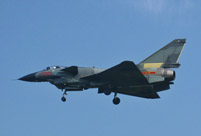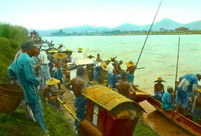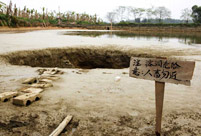

In an exclusive Fox News interview that aired on Sunday local time, U.S. President Barack Obama said that the worst mistake he made during his presidency was failing to plan for the aftermath of the 2011 toppling of Libyan dictator Moammar Gadhafi.
Blaming the current situation in Libya on its allies being “absent-minded,” Obama does not consider the military intervention in Libya itself as a mistake. On the contrary, he is pleased that the U.S. has overthrown the Gadhafi regime at a very low cost, with its allies taking the lead. This selective and limited intervention is no doubt an important characteristic of "Obama-ism."
Obama was elected as the U.S. president under his banner of "change," promising to adjust the previous foreign policy of the Bush administration, and in particular to put an end to the wars in Afghanistan and Iraq. He didn't mean to follow the steps of his predecessor; however, he is still part of the administration that started the war in Libya.
Obama’s policy of "selective intervention" has often been less successful than it was intended to be. Sanctions placed by the U.S. on Syria and its allies have cost the Bashar al-Assad government control over its territory, throwing the country into total chaos.
So far, millions of people in Syria have lost their homes and even their lives, and the Syrian refugee crisis has swept across Europe. Such intervention by Western countries has opened a Pandora's Box and brought serious consequences to both Libya and Syria.
More cautious when it comes to military matters, Obama's diplomacy has in fact differed from that of Bush. Soon after he sworn in, Obama paid a visit to the Middle East in the hope of fulfilling his campaign promises. However, the situation in the Middle East has not been improved since Obama came into office, and it actually worsened after the Arab Spring revolutionary wave at the end of 2010. Islamic State has gained more power by taking advantage of the chaos.
Meanwhile, the U.S.-Russia relationship, which Obama promised to “reboot,” has sunk to a new low due to the crisis in Ukraine. All of this happened during Obama’s presidency.
"Security" and "democracy" are the mostly commonly cited reasons for the U.S. to get involved in another country’s affairs. When the U.S. believes that a given country endangers U.S. or global security, or that a country is going against the democratic values of the Western world, the U.S. has historically been quick to intervene.
It's easy for the U.S. to topple the government of a small country given its powerful military and international status. However, the post-war reconstruction does not always get factored into the equation.
From Bill Clinton's "new interventionism" to George W. Bush's "new conservatism" to Barack Obama's "selective intervention," the methods of U.S. intervention did change after the Cold War. Their essence, however, remains the same, as does the fact that they are rarely followed by peace and stability.
There are many problems with the basic principles of U.S. diplomacy, which are not only reflected in the country’s Middle East policies, but also have an impact on China-U.S. ties.
Obama made active overtures toward China early in his presidency, which were closely tied to late Bush policies and meant to foster a smooth transition. However, the U.S. has not corrected its mistakes on Taiwan, Tibet and other issues, which has led to some turbulence in bilateral relations. The interference of the U.S. in the South China Sea issue has also complicated regional tensions and China-U.S. relations.
China and the U.S. are two major powers, both with huge worldwide influence. For that reason, diplomatic missteps cannot be taken lightly. Obama has failed to acknowledge his mistaken policies in the Middle East, and he has not been sufficiently careful or reflective when it comes to the Asia-Pacific Rebalance Strategy. Either American diplomacy must undergo a major shift, or the same mistakes will happen again and again.
(The author is an expert on international studies.)
 The evolution of J-10 fighter
The evolution of J-10 fighter Top 10 Asian beauties in 2016
Top 10 Asian beauties in 2016 Train rides through blossoms
Train rides through blossoms When female soldiers meet flowers
When female soldiers meet flowers North Sea Fleet conducts drill in West Pacific Ocean
North Sea Fleet conducts drill in West Pacific Ocean Old photos record the change of Sichuan over a century
Old photos record the change of Sichuan over a century Breathtaking aerial photos of tulip blossoms in C China
Breathtaking aerial photos of tulip blossoms in C China Horrific: Pit swallows 25 tons of fish overnight
Horrific: Pit swallows 25 tons of fish overnight Police officers learn Wing Chun in E. China
Police officers learn Wing Chun in E. China Top 20 hottest women in the world in 2014
Top 20 hottest women in the world in 2014 Top 10 hardest languages to learn
Top 10 hardest languages to learn 10 Chinese female stars with most beautiful faces
10 Chinese female stars with most beautiful faces China’s Top 10 Unique Bridges, Highways and Roads
China’s Top 10 Unique Bridges, Highways and Roads Foreigners weigh in on their experiences at Chinese hospitals
Foreigners weigh in on their experiences at Chinese hospitals Chinese TV series ‘Nirvana in Fire’ sets South Korea aflame
Chinese TV series ‘Nirvana in Fire’ sets South Korea aflame Public can’t make up for institutional failings
Public can’t make up for institutional failings China’s AI ambitions
China’s AI ambitionsDay|Week